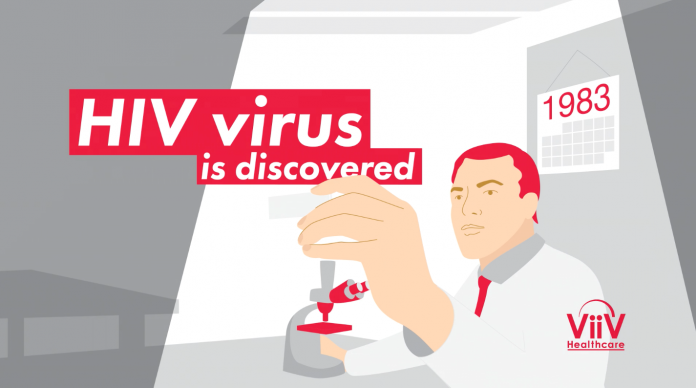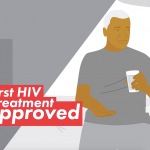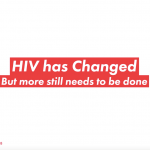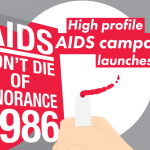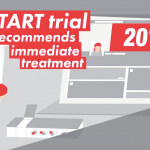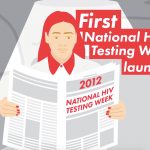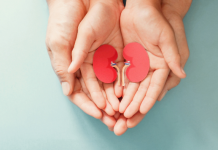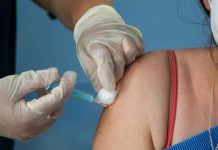ViiV Healthcare launches JulucaÒ ▼ (dolutegravir/rilpivirine) the first 2-drug regimen, once-daily, single-pill for the treatment of HIV in the UK
Dolutegravir/rilpivirine is the smallest complete treatment regimen available for people living with HIV (PLHIV)
ViiV Healthcare, the global specialist HIV company, majority owned by GlaxoSmithKline, with Pfizer Inc. and Shionogi Limited as shareholders, today launches dolutegravir/rilpivirine in the UK for the treatment of HIV infection in adults who are virologically suppressed (HIV-1 RNA < 50 copies /mL) on a stable antiretroviral regimen for at least six months with no history of virological failure and no known or suspected resistance to any non-nucleoside reverse transcriptase inhibitor or integrase inhibitor1. Dolutegravir/rilpivirine is a 2-drug regimen of dolutegravir (ViiV Healthcare) and rilpivirine (Janssen Therapeutics, Division of Janssen Products LP).
“Due to treatment advances today, PLHIV are healthier and living longer than ever before. However, a life time of treatment exposes them to ongoing side-effects and drug-to-drug interactions which can negatively impact their quality of life,” said Marta Boffito, Consultant Physician in HIV medicine at The Chelsea and Westminster Hospital. “Clinical trials have shown that dolutegravir/rilpivirine is as effective as the current standard of care and is a potential treatment option to support PLHIV who are now growing old.”
Dolutegravir/rilpivirine is ViiV Healthcare’s first 2-drug regimen, once-daily, single-pill that combines dolutegravir the most widely prescribed integrase inhibitor (INI) worldwide, with the non-nucleoside reverse transcriptase inhibitor (NNRTI) rilpivirine. This launch brings a novel treatment option to the estimated 100,000 PLHIV in the UK who will now be on treatment for a life time2.
Deborah Whitehouse, Country Manager of ViiV UK, added, “At ViiV our goal is to make HIV a smaller part of people’s lives by reducing the lifetime burden of disease and daily HIV treatment. We believe that as the first 2-drug regimen, dolutegravir/rilpivirine has an important role to play in managing HIV today now that it is a life-long condition. We are working with the NHS to ensure PLHIV who are suitable for dolutegravir/rilpivirine have access as soon as possible.”
The launch of dolutegravir/rilpivirine in the UK follows the European Commission (EC) granting marketing authorisation for dolutegravir/rilpivirine in May 2018. This was based primarily on data from the SWORD studies, presented at the Conference for Retroviruses and Opportunistic Infections 2017 and later published in The Lancet, which showed that a dolutegravir and rilpivirine regimen is non-inferior to traditional three and four drug regimens in maintaining virologic suppression (HIV-1 RNA <50 copies/mL) through 48 weeks in adults who are infected with HIV-1. The individual SWORD-1 and SWORD-2 studies and the pooled SWORD data analysis demonstrated that dolutegravir plus rilpivirine is non-inferior to continued anti-retroviral treatment regimen, with 95% of subjects in both arms achieving the primary endpoint of <50 copies/mL plasma HIV-1 RNA at Week 48. Participating adults had stable plasma HIV-1 RNA (viral load <50 copies/mL) for 6 months or longer at screening, with no resistance to the individual components of Juluca.
Today, a person starting #HIV treatment at age 20 can expect to see their 78th birthday. HIV is a manageable, long-term #chroniccondition #HIVHasChanged pic.twitter.com/8IZSgis4Vd
— ViiV Healthcare (@ViiVHC) June 6, 2018
Additional information
In June 2014, ViiV Healthcare and Janssen Sciences Ireland UC, one of the Janssen Pharmaceutical Companies of Johnson & Johnson, announced a collaboration to investigate the potential of combining dolutegravir and rilpivirine in a single pill in order to expand the treatment options available to people living with HIV.
Safety information
Juluca (dolutegravir 50mg, rilpivirine 25mg) is contraindicated in any patient with hypersensitivity to the active substances dolutegravir or rilpivirine or to any of the excipients.
Juluca is contraindicated in patients taking:
- dofetilide
- the anticonvulsants carbamazepine, oxcarbazepine, phenobarbital, phenytoin
- the antimycobacterials rifampicin, rifapentine
- proton pump inhibitors, such as omeprazole, esomeprazole, lansoprazole, pantoprazole, rabeprazole
- the systemic glucocorticoid dexamethasone, except as a single dose treatment
- St John’s wort (Hypericum perforatum)
Factors that decrease the exposure of the components of Juluca should be avoided. Juluca should not be taken with any other medicinal products containing dolutegravir or rilpivirine or antiretroviral medicinal products used for the treatment of HIV.
The safety and efficacy of Juluca has not yet been established in patients <18 years and/or in women who are pregnant. Use of Juluca in these patient populations is not recommended.
No dosage adjustment is required in patients with mild or moderate renal impairment. In patients with severe or end stage renal disease, the combination of Juluca with a strong CYP3A inhibitor should only be used if the benefit outweighs the risk. No data are available in subjects receiving dialysis although differences in pharmacokinetics are not expected in this population.
No dosage adjustment is required in patients with mild or moderate hepatic impairment (Child-Pugh score A or B). Juluca should be used with caution in patients with moderate hepatic impairment. No data are available in patients with severe hepatic impairment (Child-Pugh score C); therefore Juluca is not recommended in these patients.
Hypersensitivity reactions have been reported with dolutegravir and were characterised by rash, constitutional findings, and sometimes, organ dysfunction, including severe liver reactions. Juluca should be discontinued immediately if signs or symptoms of hypersensitivity reactions develop (including, but not limited to, severe rash or rash accompanied by raised liver enzymes, fever, general malaise, fatigue, muscle or joint aches, blisters, oral lesions, conjunctivitis, facial oedema, eosinophilia, angioedema). Clinical status including liver aminotransferases and bilirubin should be monitored. Delay in stopping treatment with Juluca after the onset of hypersensitivity may result in a life-threatening allergic reaction.
In HIV-infected patients with severe immune deficiency at the time of institution of combination antiretroviral therapy (CART), an inflammatory reaction to asymptomatic or residual opportunistic pathogens may arise and cause serious clinical conditions, or aggravation of symptoms. Typically, such reactions have been observed within the first few weeks or months of initiation of CART. Relevant examples are cytomegalovirus retinitis, generalised and/or focal mycobacterial infections, and Pneumocystis jirovecii pneumonia. Any inflammatory symptoms should be evaluated and treatment instituted when necessary. Autoimmune disorders (such as Graves’ disease) have also been reported to occur in the setting of immune reconstitution, however, the reported time to onset is more variable and these events can occur many months after initiation of treatment.
Monitoring of liver function is recommended in patients with hepatitis B and/or C co-infection. No clinical data are available in patients with hepatitis B co-infection. Physicians should refer to current treatment guidelines for the management of HIV infection in patients co-infected with hepatitis B virus. Limited data is available in patients with hepatitis C co-infection. A higher incidence of liver chemistry elevations (Grade 1) were observed in patients treated with dolutegravir and rilpivirine co-infected with hepatitis C compared to those who were not co-infected.
Patients should be advised that Juluca does not cure HIV infection and that they may still develop opportunistic infections and other complications of HIV infection. Therefore, patients should remain under close clinical observation by physicians experienced in the treatment of these associated HIV diseases.
Although the aetiology is considered to be multifactorial (including corticosteroid use, biphosphonates, alcohol consumption, severe immunosuppression, higher body mass index), cases of osteonecrosis have been reported in patients with advanced HIV-disease and/or long-term exposure to CART. Patients should be advised to seek medical advice if they experience joint aches and pain, joint stiffness or difficulty in movement.
At supra-therapeutic doses (75 and 300 mg once daily), rilpivirine has been associated with prolongation of the QTc interval of the electrocardiogram (ECG). Rilpivirine at the recommended dose of 25 mg once daily is not associated with a clinically relevant effect on QTc. Juluca should be used with caution when co-administered with medicinal products with a known risk of Torsade de Pointes.
Please refer to the full Juluca Summary of Product Characteristics for full prescribing information, including contraindications, special warnings and precautions for use.
Reporting of side effects
Adverse events should be reported. For the UK, reporting forms and information can be found at www.mhra.gov.uk/yellowcard or search for MHRA Yellowcard in the Google Play or Apple App store. Adverse events should also be reported to GSK UK Safety Team on 0800 221 441 selecting option 3 or email UK PharmaSafety team (uksafety@gsk.com).
▼ This medicinal product is subject to additional monitoring. This will allow quick identification of new safety information. Healthcare professionals are asked to report any suspected adverse reactions.
About ViiV Healthcare
ViiV Healthcare is a global specialist HIV company established in November 2009 by GlaxoSmithKline (LSE: GSK) and Pfizer (NYSE: PFE) dedicated to delivering advances in treatment and care for people living with HIV and for people who are at risk of becoming infected with HIV. Shionogi joined in October 2012. The company’s aim is to take a deeper and broader interest in HIV/AIDS than any company has done before and take a new approach to deliver effective and innovative medicines for HIV treatment and prevention, as well as support communities affected by HIV.
For more information on the company, its management, portfolio, pipeline, and commitment, please visit www.viivhealthcare.com.
References
- Juluca Summary of Product Characteristics, May 2018.
- HIV in the UK – 2016 report. December 2016. Public Health England, London.
- Llibre JM et al. Efficacy, safety, and tolerability of dolutegravir-rilpivirine for the maintenance of virological suppression in adults with HIV-1: phase 3, randomised, non-inferiority SWORD-1 and SWORD-2 studies. The Lancet. 2018 Mar 3;391(10123):839-849.

